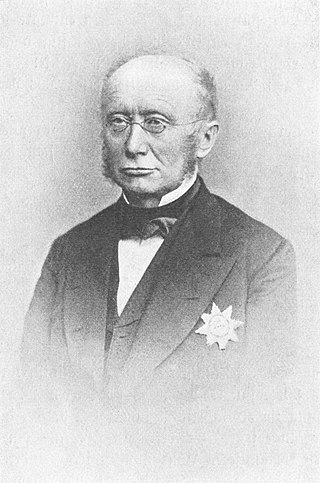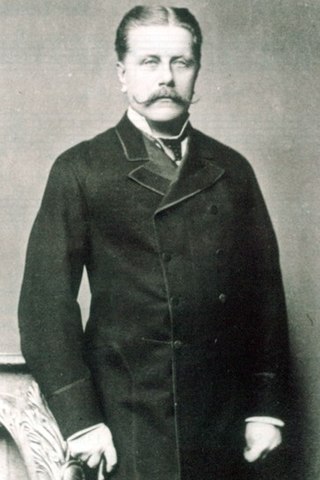
Ludwig III was the last King of Bavaria, reigning from 1913 to 1918. Initially, he served in the Bavarian military as a lieutenant and went on to hold the rank of Oberleutnant during the Austro-Prussian War. He entered politics at the age of 18 becoming a member of the Bavarian parliament and was a keen participant in politics, supporting electoral reforms. Later in life, he served as regent and de facto head of state from 1912 to 1913, ruling for his cousin, Otto. After the Bavarian parliament passed a law allowing him to do so, Ludwig deposed Otto and assumed the throne for himself. He led Bavaria during World War I. His short reign was seen as championing conservative causes and he was influenced by the Catholic encyclical Rerum novarum.

Georg Friedrich Karl Freiherr von Hertling, from 1914 Count von Hertling, was a German politician of the Catholic Centre Party. He was foreign minister and minister president of Bavaria, then chancellor of the German Reich and minister president of Prussia from 1 November 1917 to 30 September 1918. He was the first party politician to hold the two offices; all the others were career civil servants or military men.

Baron Ludwig von Windthorst was a German politician and leader of the Catholic Centre Party and the most notable opponent of Chancellor Otto von Bismarck during the Prussian-led unification of Germany and the Kulturkampf. Margaret L. Anderson argues that he was "Imperial Germany's greatest parliamentarian" and bears comparison with Irishmen Daniel O'Connell and Charles Stewart Parnell "in his handling of party machinery and his relation to the masses."

The Kingdom of Bavaria was a German state that succeeded the former Electorate of Bavaria in 1806 and continued to exist until 1918. With the unification of Germany into the German Empire in 1871, the kingdom became a federated state of the new empire and was second in size, power, and wealth only to the leading state, the Kingdom of Prussia.

The House of Bismarck is a German noble family that rose to prominence in the 19th century, largely through the achievements of the statesman Otto von Bismarck. He was granted a hereditary comital title in 1865, the hereditary title of Prince of Bismarck in 1871, and the non-hereditary title of Duke of Lauenburg in 1890. Several of Otto von Bismarck's descendants, notably his elder son Herbert, Prince of Bismarck, have also been politicians.
Clemens Erwein Heinrich Karl Bonaventura Freiherr von und zu Franckenstein was a German opera composer.

Louis Kraft Ernest, Prince of Oettingen-Wallerstein was a Bavarian statesman and German prince of the House of Oettingen-Wallerstein. He succeeded his father as ruling Prince of Wallerstein in 1802 but lost his sovereignty in 1806 due to Mediatisation.

Dietrich Heinrich Ludwig Freiherr von Ompteda was a Hanoverian jurist and government minister.

The House of Franckenstein is the name of a feudal, Franconian noble family in Germany, descendants from the Dynasts of the Breuberg family; offsprings of the Lords of Lützelbach from Höchst im Odenwald.

Karl August Joseph Maria Donatus, Count of Seinsheim was the Bavarian Finance Minister and President of the Bavarian Chamber of Deputies.

Otto Grafzu Stolberg-Wernigerode was an Imperial German officer, diplomat and politician who served as the first vice-chancellor of the German Empire under Otto Von Bismarck between 1878 and 1881.

The Reichstag of the German Empire was Germany's lower House of Parliament from 1871 to 1918. Within the governmental structure of the Reich, it represented the national and democratic element alongside the federalism of the Bundesrat and the monarchic and bureaucratic element of the executive, embodied in the Reich chancellor. Together with the Bundesrat, the Reichstag had legislative power and shared in decision-making on the budget. It also had certain rights of control over the executive branch and could engage the public through its debates. The emperor had little political power, and over time the position of the Reichstag strengthened with respect to both the imperial government and the Bundesrat.
Events from the year 1871 in Germany.

The Reichstag of the North German Confederation was the federal state's lower house of parliament. The popularly elected Reichstag was responsible for federal legislation together with the Bundesrat, the upper house whose members were appointed by the governments of the individual states to represent their interests. Executive power lay with the Bundesrat and the king of Prussia acting as Bundespräsidium, or head of state. The Reichstag debated and approved or rejected taxes and expenditures and could propose laws in its own right. To become effective, all laws required the approval of both the Bundesrat and the Reichstag. Voting rights in Reichstag elections were advanced for the time, granting universal, equal, and secret suffrage to men above the age of 25.
The German tariff of 1879 was a protectionist law passed by the Reichstag that imposed tariffs on industrial and agricultural imports into Imperial Germany.
The House of Councillors was the upper house of the Landtag of the Kingdom of Bavaria during its existence both as an independent state and as a federal subject of the German Empire. The House of Councillors was established by the 1818 Constitution of the kingdom, and its composition and powers remained unchanged until its abolition under the 1919 Bamberg Constitution.

Maximilian Carl Theodor, Count von Holnstein aus Bayern was a German nobleman who was a playmate of princes Ludwig and Otto, and friend of Ludwig on his accession as Ludwig II. Count Maximilian brought Ludwig's "Kaiserbrief" to Otto von Bismarck.
Karl Borromäus Vincenz Franz, Freiherr von und zu Franckenstein was an Austro-Hungarian diplomat.
Klemens August Emmerich, 3rd Count of Schönborn-Wiesentheid was an Austrian Reichsrat and Member of the Reichstag of the German Empire.













